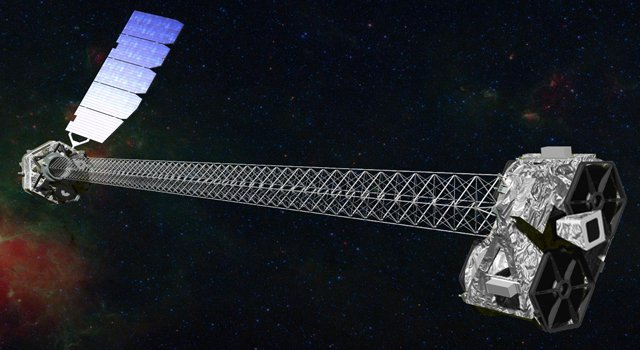

PASADENA, Calif. -- The Tuesday, March 13, media briefing to discuss the upcoming launch of the Nuclear Spectroscopic Telescope Array (NuSTAR) has been postponed. The spacecraft will lift off on an Orbital Sciences Pegasus XL rocket, which will be released from an aircraft originating from the Kwajalein Atoll in the Marshall Islands.
The mission's Flight Readiness Review (FRR) is being rescheduled for no earlier than Thursday, March 15, to allow time for a review of data and simulations to qualify software associated with a new Pegasus flight computer.
A revised launch date will be set at the FRR. A pre-launch media briefing will be rescheduled after the FRR is complete.
NuSTAR will use advanced optics and detectors, allowing astronomers to observe the high-energy X-ray sky with much greater sensitivity and clarity than any mission flown before. The mission will advance our understanding of how structures in the universe form and evolve. It will observe some of the hottest, densest and most energetic objects in the universe, including black holes, their high-speed particle jets, ultra-dense neutron stars, supernova remnants and our sun.
NuSTAR is a Small Explorer mission led by the California Institute of Technology and managed by NASA's Jet Propulsion Laboratory, both in Pasadena, Calif., for NASA's Science Mission Directorate. The spacecraft was built by Orbital Sciences Corporation, Dulles, Va. Its instrument was built by a consortium including Caltech; JPL; the University of California, Berkeley; Columbia University, New York; NASA's Goddard Space Flight Center in Greenbelt, Md.; the Danish Technical University in Denmark; Lawrence Livermore National Laboratory, Calif.; and ATK Aerospace Systems, Goleta, Calif. NuSTAR will be operated by UC Berkeley, with the Italian Space Agency providing its equatorial ground station located at Malindi, Kenya. The mission's outreach program is based at Sonoma State University, Calif. NASA's Explorer Program is managed by Goddard. JPL is managed by Caltech for NASA.